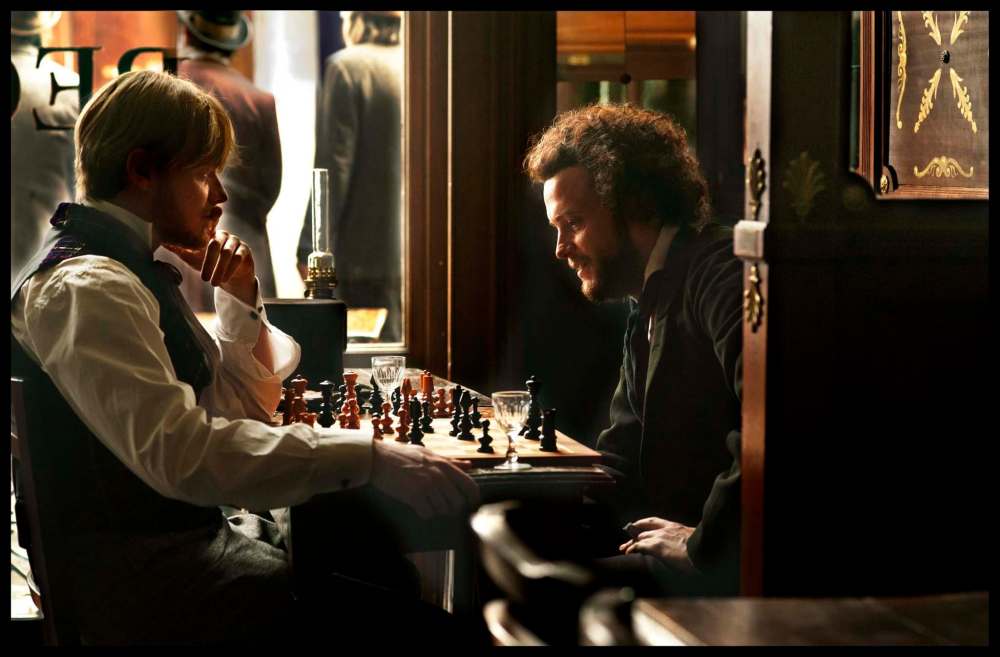Dull biopic gets only part Marx for effort
Advertisement
Read this article for free:
or
Already have an account? Log in here »
To continue reading, please subscribe:
Monthly Digital Subscription
$0 for the first 4 weeks*
- Enjoy unlimited reading on winnipegfreepress.com
- Read the E-Edition, our digital replica newspaper
- Access News Break, our award-winning app
- Play interactive puzzles
*No charge for 4 weeks then price increases to the regular rate of $19.00 plus GST every four weeks. Offer available to new and qualified returning subscribers only. Cancel any time.
Monthly Digital Subscription
$4.75/week*
- Enjoy unlimited reading on winnipegfreepress.com
- Read the E-Edition, our digital replica newspaper
- Access News Break, our award-winning app
- Play interactive puzzles
*Billed as $19 plus GST every four weeks. Cancel any time.
To continue reading, please subscribe:
Add Free Press access to your Brandon Sun subscription for only an additional
$1 for the first 4 weeks*
*Your next subscription payment will increase by $1.00 and you will be charged $16.99 plus GST for four weeks. After four weeks, your payment will increase to $23.99 plus GST every four weeks.
Read unlimited articles for free today:
or
Already have an account? Log in here »
Hey there, time traveller!
This article was published 18/05/2018 (2730 days ago), so information in it may no longer be current.
Political theory meets period bromance, in this fascinating failure by filmmaker and activist Raoul Peck. Dramatizing the relationship between the young Karl Marx (August Diehl of Inglourious Basterds) and Friedrich Engels (Stefan Konarske), Peck struggles to express revolutionary thought in the form of a traditional historical biopic.
It doesn’t exactly work, but compelling performances — and Peck’s intrepidly weird attempts to somehow make reading, writing and thinking cinematic — make it watchable just the same.
Peck, who served as Haiti’s minister of culture in the 1990s, is a cerebral and political filmmaker. His 2016 documentary I Am Not Your Negro is a provocatively brilliant cinematic essay based on the works of James Baldwin. Combining the foundational ideas of Marxism with costume drama is a much trickier project.

The Young Karl Marx (in German and French, with subtitles) casts the authors of The Communist Manifesto as an almost comic odd couple. Engels is the son of a wealthy textile magnate who likes fox hunting and good wine but is morally repulsed by the conditions in his father’s Manchester mills and the working-class slums that surround them. Marx, scruffy and intense, is a freelance writer, and he and his wife, Jenny von Westphalen-Marx (Vicky Krieps), are perpetually broke and one step ahead of the bailiffs.
Marx and Engels have a meet-cute, eyeing each other up suspiciously. Marx initially dismisses Engels as an amateur dabbler, while Engels views Marx as unnecessarily obstreperous. (Can’t these two social-and-economic thinkers see they’re made for each other?) It’s soon revealed, however, that they’ve fallen for each other’s writings. They bond over a night of boozing and a whimsical chase scene as they attempt to avoid the Paris police.
The look of the film is at the ragged end of the Masterpiece Classic spectrum, with lots of mud-coloured clothes and filthy streets and miserable hovels and dark satanic mills.
Peck, along with co-scripter Pascal Bonitzer, focuses mostly on Marx and Engels, but he does try to bring in the women in their lives. Jenny Marx holds her own (Krieps knows a thing or two about the hard work of propping up male genius from her role in The Phantom Thread), but Mary Burns (Wolf Hall’s Hannah Steele), an Irish-born factory worker who lived with Engels until her death, isn’t given much to do.
The film concentrates on the seven years leading up to the publication of The Communist Manifesto, carefully tracking the men’s developing thought and their rivalries and run-ins with those they view as sentimental socialists, overly vague mutualists or utopian anarchists — though the pair reserves their most contemptuous eye-rolling for the Young Hegelians. (I honestly can’t tell if Marx’s hate-on for Karl Theodor Ferdinand Grun is supposed to read as deadly serious or broadly comic, but by the film’s end it’s operating at Seinfeld-Newman extremes.)
Without a lot of dramatic context, these ideological encounters sometimes come off like the Monty Python satire of competing left-wing revolutionary groups (“Splitters!”). The story does better when these political positions are channelled through relationships among characters, as we see with Pierre-Joseph Proudhon.
Slyly played by Olivier Gourmet, the French thinker comes off as a bemused father figure, while the young Marx views the older man with a mixture of admiration and resentment.
This Freudian dynamic comes to a crisis when Marx responds to Proudhon’s The Philosophy of Poverty by writing The Poverty of Philosophy. (Ouch.)
Mostly, though, the film struggles heroically with the challenge of combining complex thought and conventional dramatic momentum, especially when characters have to deliver lines such as this:
“I believe it is important to assert that materialism as we conceive it differs from bourgeois materialism by questing for a more humane society.”
With this kind of specialist dialogue, the film’s tone can be genuinely hard to gauge. Take a montage of Marx reading and writing and pondering, which is sort of like the classic training montage from a sports movie except with more dialectical materialism. The sequence is either an epic failure or a brilliant bit of deadpan.
In the spirit of May Day, I’ll interpret it as the latter.
alison.gillmor@freepress.mb.ca

Studying at the University of Winnipeg and later Toronto’s York University, Alison Gillmor planned to become an art historian. She ended up catching the journalism bug when she started as visual arts reviewer at the Winnipeg Free Press in 1992.
Our newsroom depends on a growing audience of readers to power our journalism. If you are not a paid reader, please consider becoming a subscriber.
Our newsroom depends on its audience of readers to power our journalism. Thank you for your support.


